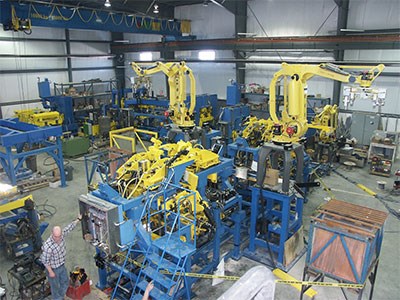The president and CEO of the Sudbury-based Ionic Engineering group of companies says he was shocked when he read Greg Baiden, the CEO of Penguin Automated Systems, say Sudbury mining companies lack innovation.
“I do absolutely no work in this city. I wouldn't want to and I don't need to,” Baiden said. “I don't do it because I don't find the people in the mining companies here very innovative.”
Baiden targeted most of his criticism at Sudbury mining giants Vale and Glencore.
Penguin Automated Systems is a Sudbury-based mining supply and services company that specializes in advanced robotics, data communications technologies and positioning systems.
Baiden made the comments at the launch of the 2014 Greater Sudbury Vital Signs report Oct. 7.
“I was absolutely infuriated when I saw that, because it really disrespects what we do and it disrespects so many of the other good companies,” said Steve Matusch, the president and CEO of Ionic Engineering.
In an interview with Northern Ontario Business Baiden said Glencore's research on its process side was an exception, and has proven to be innovative.
He also had great praise for many of the smaller companies that make up Sudbury's mining supply and services sector.
“Smaller companies are being extremely innovative because they have to be in order to stay in business,” he said. “We have some bring spots.”
But Matusch has maintained Baiden's overall critique of Vale and Glencore is misplaced.
“You have to credit the big companies here, the Glencores and the Vales, for helping companies like ours develop. There are so many companies that were allowed to innovate, by the Glencores and Vales, to come up with new ideas and commercialize them,” he said. “Without them here, Greg Baiden's company wouldn't be here.”
Matusch said due to his academic background, much of Baiden's work at Penguin Automated Systems has focused on bleeding edge research, such as collaborating with NASA to develop robots that can mine in the vacuum of space.
But Matusch said incremental innovation, which is more common in Sudbury's mining sector, and in most industries, is just as important as the big leaps forward.
“It's not as sexy or glamourous as mining on the moon, perhaps, but it's the stuff that keeps these places alive,” he said.
Since 1998, Ionic Engineering has helped foster incremental innovations in the mining sector, and other industries such as automotive manufacturing and power generation.
“We are the first company in the world, to commercialize industrialized robotics in refining applications,” Matusch said.
Robotic manufacturing methods that were first introduced to the automotive industry in the 1970s and 1980s, evolved over time, to the point where they could be applied to mining.
“In the early days, robotics made no sense in mining, smelting and refining operations,” Matusch wrote in a statement. “The systems were too small, too fragile, and unproven in 'heavy and dirty' applications that dominate this industry.”
By 2004 Ionic started to provide robotics systems to mining companies around the world.
Northern Ontario Business contacted Vale and Glencore to respond to Baiden's critiques, but representatives with both companies said they would not comment.
Baiden's statement conflicted with some of Vital Signs Report's conclusions, which paid special attention to the efforts both Vale and Glencore made to improve their sulfur dioxide outputs.
In 2013, the emission of sulfur dioxide from Vale was 151.9 kilotonnes, a decrease of 92.4 per cent from 2,000 kilotonnes in 1970.
Similarly, the emission of sulfur dioxide from Glencore in 2013 was 26.3 kilotonnes, a decrease of 92.3 per cent from 340.0 kilotonnes in 1970.
The report cited Vale's ongoing Clean AER Project and its $1-billion investment to retrofit its smelter operations in Sudbury.
As of 2014, Glencore has also announced it will spend $400 million to upgrade Greater Sudbury’s Falconbridge smelter to meet the new provincial air quality standards, under Ontario Regulation 419/05, which will take effect in July, 2016.
But Baiden said both companies did not improve their emissions standards by choice.
“That was legislated. They were told to do that,” he said. “If you don't do that you're going out of business.”




